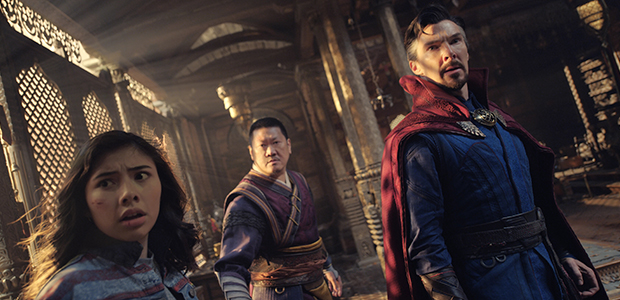
As far as sequels go, Doctor Strange in the Multiverse of Madness is a stilted one, especially by MCU’s lofty standards. It has imaginative visuals that strive to exploit the full potential and wondrous promise of parallel dimensions and multiple versions of characters we know, but, somewhere between fan service, cameo roll calls, and an overstuffed plot, the film feels bloated.
The original Doctor Strange was one of the better origin stories from the studio. Following this, the character developed further to eventually become a mainstay of the franchise, leading epochal moments in the previous Avengers films, but here the plot includes him but forgets to involve him. The Strange sequel is really more about Wanda and her story as a continuation of what started in the WandaVision TV show. This is really Marvel/Disney attempting to connect all the disparate dots from their broadcast media and therefore, in this moment of ambitious overreach, falling short of the quality we expect.
Marvel has been teasing us about the concept of the multiverses for many, many films. In my own lead-up to this, I re-watched the original and realized that it was a term mentioned even back then. Few films however have really done the concept meaningful justice in the way Into the Spider-verse did (which explains why that film is so beloved) and to see Multiverse of Madness attempt, but fall short, is a bit dismaying, especially with a veteran like Sam Raimi returning to Marvel as a director. Make no mistake, his gothic visuals retain his signature macabre, moody style – this metamorphizes into the studio’s first true horror superhero film after all – and the setup benefits from the conversion of Wanda from a potential supervillain to a demonic, murderous witch.
Collectively, cinemagoers have been gradually warming up to the complex concepts explored here and in TV shows such as What If…?, but what we get this time around isn’t grounded in a deeper sense of purpose and feels like, well, showing off. Flipping the scenario from Spider-Man: No Way Home, to make the protagonists the outworldly drifter stuck in another unknown universe trying to find their way back doesn’t provide the same satisfaction because we are fleetingly introduced to many random characters from the larger comics canon (accompanied by plenty of fan cheer) that clearly are disposable and serve little purpose beyond spectacle. They are presented and then promptly binned for exhibition and shock, and the effect is as throwaway as it has always been when used in the comics that inspired it.
I may sound harshly critical, but there is still much to enjoy here. With Raimi’s skillful fusion of genres, there is plenty of newness in how the usual superhero tropes are handled, but I wish more thought was given to script cohesion and the banter between characters being more than quick expository quips. For what it’s worth though, Marvel’s controlled consistency of output these past several years made us forget what true directors with vision and perspective could do. Raimi returns to remind us of the potential and possibility of allowing a real director to truly stamp his idiosyncrasy on a production and for that, we should at least be grateful.
Rating: 



